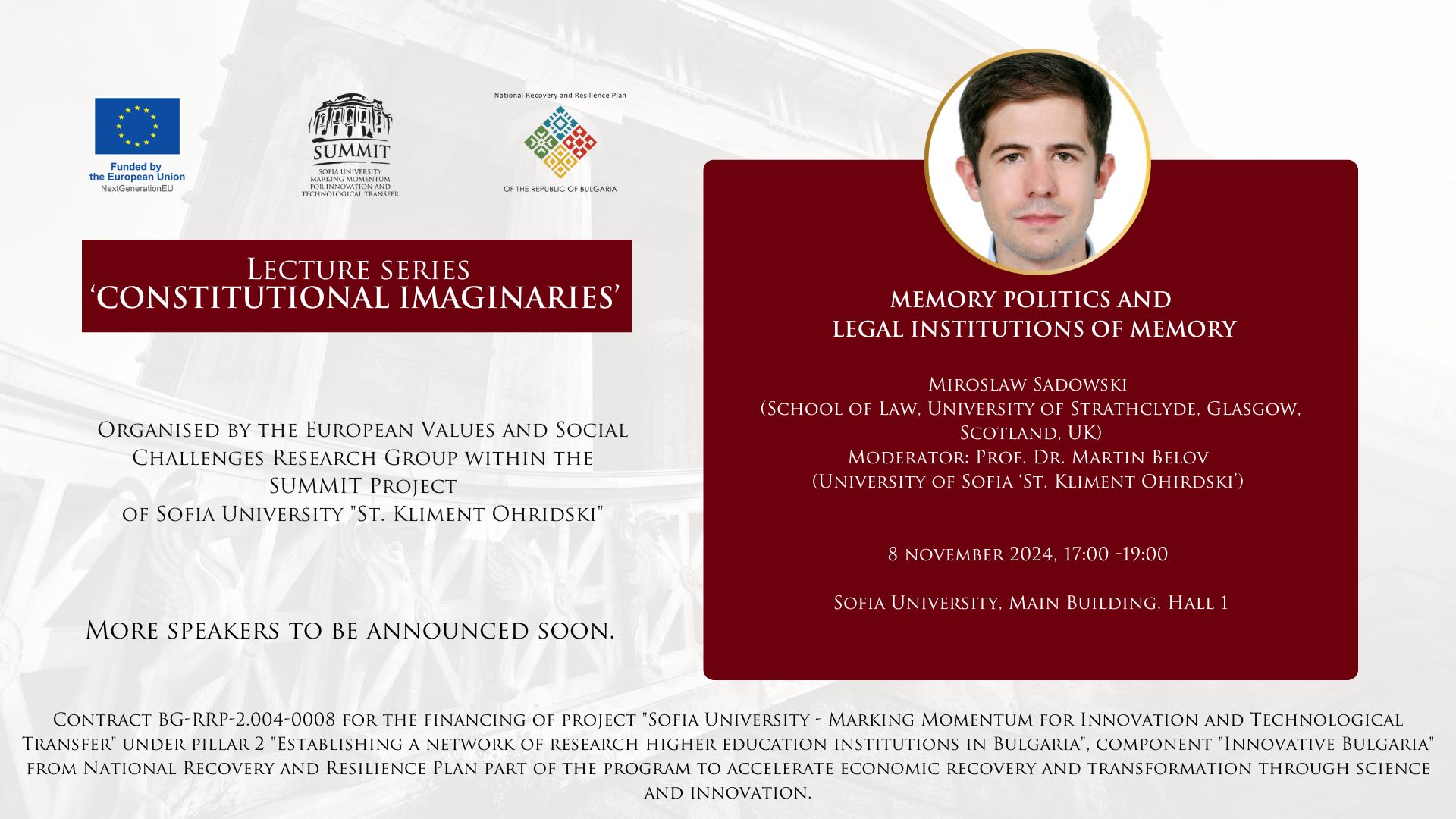Публична лекция на тема „Политика на паметта и правни институции на паметта“ ще изнесе Мирослав Садовски - 8 Ноември, 17:00 ч.

На 8 ноември 2024 г. от 17:00 в Зала 1 на Ректората на Софийски университет, Мирослав Садовски, преподавател в Юридическия факултет на Университета Стратклайд в Глазгоу, Шотландия, постдокторантски изследовател в Центъра за глобални изследвания, Университет Аберта в Лисабон и постдокторант в Бразилския център за анализ и планиране в Сао Пауло ще изнесе публична лекция на тема „Политика на паметта и правни институции на паметта“.
Докато напредваме в 21-ви век, изглежда, че се отдалечаваме от обещанията от 90-те години на миналия век да вървим напред като човечество и да оставим грешките от миналото зад гърба си; по-скоро виждаме връщане към политиката в стила на 19-ти век, но прилагана с помощта на съвременни средства, включително социални медии, подкасти и влиятелни лица (инфлуенсъри). Това важи и за политиката на паметта. Докато политиците по света са все по-заети с изграждането на конкуриращи се разкази, понякога предлагайки различни такива за вътрешна и външна употреба, въпросът за връзката между правото и паметта става особено важен, ако човек иска да разбере модерния свят.
Лекцията предлага да се съсредоточим върху изследването на връзката между правото, паметта и политиката, като се започне от философската перспектива, т.е. от анализа на разсъжденията на Дюркейм за правото, заместващо религията като основен организатор на социалния живот в съвременните общества и концепциите на Фуко за контрапаметта и контраисторията. Тези теоретични размишления ще бъдат допълнени чрез вглеждане в социологията – която ни даде термина колективна памет – и правната теория, като международното право и човешките права, които зависят особено от спомените от миналото, за да поддържат по-нататъшното развитие.
Memory Politics and Legal Institutions of Memory
As we advance further into the 21st century, we seem to move far from the 1990s promises of going forward as humanity and leaving the errors of the past behind; rather, we see the return to 19th century-style politics, only employed using the 21st century means, including social media, podcasts and influencers. This is true also of memory politics. As politicians around the world increasingly engage in the construction of competing narratives proposed either for their internal or external audience – in certain instances proposing different ones in each case – the question of the relationship between law and memory becomes particularly crucial if one wants to understand the modern world.
Thus, the lecture proposes to focus on the investigation of the relationship between law, memory and politics, beginning with the philosophical perspective, i.e., the analysis of the Durkheimian thought on law replacing religion as the main organiser of social life in contemporary societies and the Foucauldian concepts of counter-memory and counter-history. These theoretical ruminations are going to be further supplemented by looking into sociology – which gave us the term collective memory – and legal theory, with international law and human rights law particularly dependent on the memories of the past to sustain further development.
The second part of the lecture will depart from the theoretical and move on to the conceptual, explaining the idea of legal institutions of memory, i.e., those institutions of law which have as their first or secondary goal impacting on how societies perceive the past to further certain political aims – not necessarily nefarious ones. These include two soft institutions – reparations and international tribunals, two medium ones – lustration and truth (and reconciliation) commissions, and two hard ones – legal amnesia and memory legislation, depending on the intensity of the attempted impact on collective memory.
Ultimately, the third part of the lecture will focus on the practical aspects of the relationship between law and memory, taking as the case study some of the most discussed issue in the recent years: that of contentious heritage. Already before, but in particular after the 2020 Black Lives Matter protests the matter of preservation versus removal approaches to difficult heritage has been discussed in many contexts globally, with various places adopting different strategies. With the matter of post-imperial heritage approached differently in post-colonial and post-communist contexts – despite oftentimes similar results, the memory politics from such places like Canada, Portugal, Poland and Hungary are going to be discussed to present the big picture of the interplay between law, memory and politics in the present day.
Bio
Mirosław M. Sadowski. Lecturer at the School of Law, University of Strathclyde in Glasgow, Scotland; Postdoctoral Researcher within the “Mnemonic Reality” project at the Centre for Global Studies, Aberta University in Lisbon, Portugal; and Postdoctoral Fellow at CEBRAP – Brazilian Center of Analysis and Planning in São Paulo, Brazil. Main research interests at the intersections of law and memory, sociology of law and cultural heritage law, as well as international law and political science. Participation with a paper in almost fifty conferences and over 30 publications, including the monograph “Intersections of Law and Memory: Influencing Perceptions of the Past” (Routledge, 2024) based on the doctorate. Member of the SLSA, ACDS/CLSA, Open Council of Europe Academic Networks (OCEAN), as well the Richard Wagner Society of Wrocław, where he serves as the Board Member responsible for International Relations, and CompaRes - International Society for Iberian-Slavonic Studies, where he serves as Vice-President.
